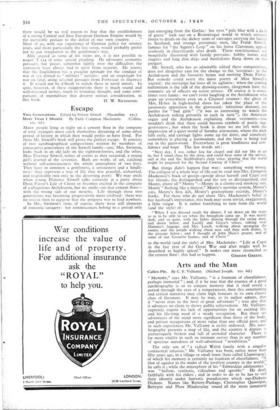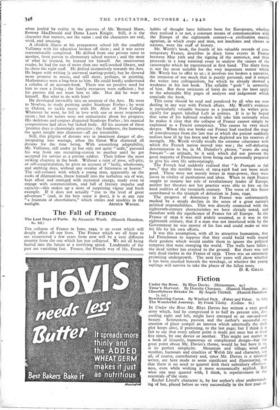Arts and the Man
Calico Pie. By C. E. Vulliamy. (Michael Joseph. vas. 6d.) " MEMORY," says Mr. Vulliamy, " is a fountain of cheerfulness, perhaps immortal " ; and, if it be true that the essence of a good autobiography is so to conjure memory that it shall reveal a period through the eyes of a temperament, then this entertaining and critical narrative may claim high honours in its own elusive class of literature. It may be true, as its author admits, that it " never rises to the level of great adventure" ; true also that it advances no claim to showy public achievement. Mr. VulliamN expressly regrets his lack of opportunities for an exciting life. and his life-long need of a steady occupation. But there are adventures of the mind more significant than those of the body. and private occupations of more value than any official post; and in such experiences Mr. Vulliamy is richly endowed. His auto- biography presents a map of life, and the country it depicts is picturesquely broken and full of crowded character. There is far more vitality in such an intimate survey than in any number of specious anecdotes of well-advertised " notabilities."
The only son of " a radical Welsh family with a singular continental infusion," Mr. Vulliamy was born, rather more than fifty years ago, in a village or small town (here called Llanwisgog). of which his memory is certainly no fountain of cheerfulness. "A blot of squalor in the midst of the loveliest country in the world,' he calls it ; while the atmosphere of his " Edwardian adolescence " was " hollow, synthetic, ridiculous and ignoble." He deals faithfully with his elders ; and in order to do so he has to veil their identity under fantastic pseudonyms which out-Dickens Dickens. Names like Rettery-Package, Christopher Quoosipat. Battypin and Phox Hindersclay sound all the more unnatural
when jostled by reality in the persons of Mr. Bernard Shaw, Ramsay MacDonald and Dame Laura Knight. Still, it is the character that matters, not the name ; and the characters are real, vivid, and amusing.
A childish illness at his preparatory school left the youthful Vulliamy with his education broken off short ; and it was never conventionally completed. He drifted from one private tutor to another, from parson to elementary school master ; and the most- of what he learned, he learned for himself. An omnivorous reader, he had the run of more than one well-stocked library, and he chose the right stuff. He drifted instinctively towards the Arts. He began with writing (a universal starting-point); but he showed more promise in music, and still more, perhaps, in painting. Mathematics were a bug-bear to him. He could hardly understand a colufim of an account-book. There was no positive need for him to earn a living ; the family resources were sufficient ; but his parents did not want him to idle. Nor did he want it himself. But what to do with him?
He developed inevitably into an amateur of the Arts. He went to Newlyn, to study painting under Stanhope Forbes ; he went to Oxford, to tackle music with Dr. Allen of New College. Wherever he went, he fell in love with one or more responsive sirens ; but his tutors were not enthusiastic about his progress. His skeletons and corpses disgusted Stanhope Forbes ; his musical compositions had ideas but lacked body. All his account of these 'prentice days is charmingly attractive ; the frankness, the humour, the quiet insight into character—all are irresistible.
Still, this pilgrim of dreams was in imminent danger of dis- integrating into wastage, when the Great War shattered all dreams for the time being. With astonishing adaptability, Mr. Vulliamy, still under 3o but only not quite " unfit," pursued his way from one recruiting-station to another until he got accepted for service as a private soldier. Then follow the most striking chapters in the book. Without a taint of pose, self-pity, or self-congratulation, he gives an account of " lucky, wholesome, and ambling days, without any residue of bitterness or horror." The self-reliance with which a young man, apparently on the rocks of dilettantism, threw himself into the turbulent sea of war, kept afloat and emerged with recreated energy, ready even to engage with commercialism, and full of literary impulse and capacity—this makes up a story of surprising vigour and fresh example. If- it does not actually " rise to the level of great adventure " (and, in the best sense it does), it is at any rate " a fountain of cheerfulness," which smiles and sparkles in the



























 Previous page
Previous page